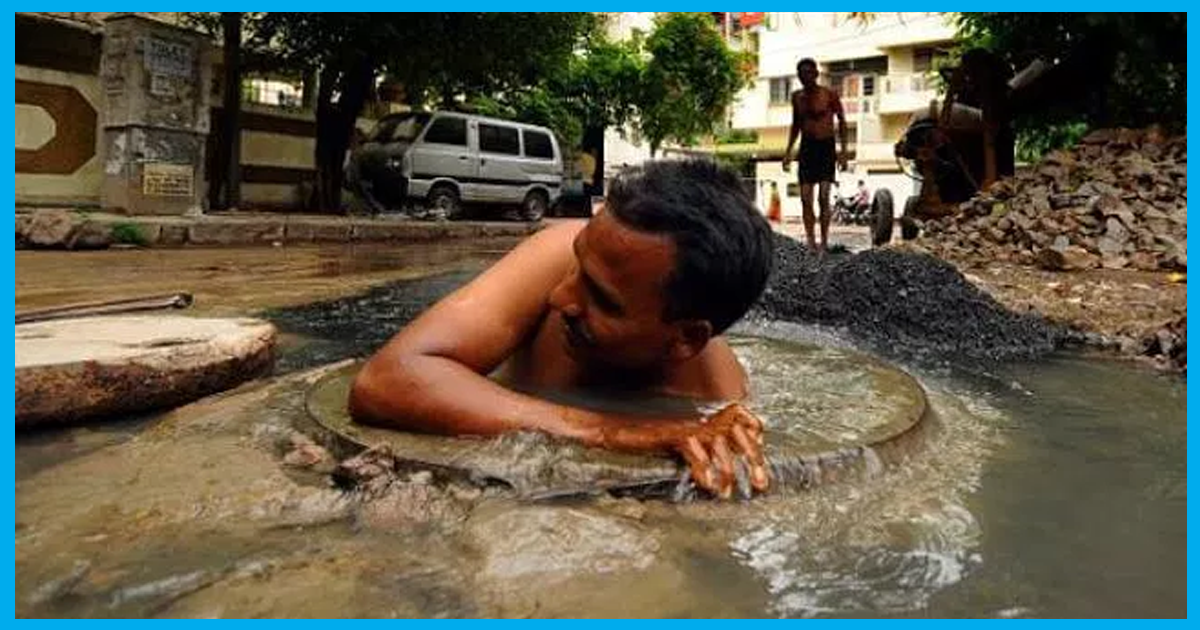
Karnataka: Panchayat Officer Who Forced Workers To Clean Manhole Suspended
9 Jun 2017 12:15 PM GMT
Police in Mysuru, Karnataka have suspended a Gram Panchayat Development Officer (PDO) for directing two workers to indulge in manual scavenging.
A case has been registered against the PDO, Anand, and the Gram Panchayat President, Geetha Nayak.
The conservancy workers – Ganesh, 30, and Cheluva, 50 – were directed by Nayak and Anand to clean the manhole in Kaggadasaura village.
The incident happened on 6 June at 9 AM.
Case registered under Prohibition of Employment as Manual Scavengers Act
A case has been filed against Anand and Geetha Nayak under various sections of the Karnataka Gram Swaraj and Panchayat Raj Act, 1993, and the Prohibition of Employment as Manual Scavengers and Their Rehabilitation Act, 2013, and under Section 506 of the Indian Penal Code (IPC).
The manhole is reportedly located next to the Gram Panchayat President’s house.
Assistant Director of Taluk Social Welfare Department DG Gurushanthappa was quoted as saying by IANS, “The conservancy workers complained to me against Nayak and Anand for making them enter into a manhole to clean it. Anand has complained of nausea and dizziness. We admitted him to KR Hospital in Mysuru for treatment.”
Mysuru Assistant Commissioner of Police – KR Division C. Mallik said, “We have received a complaint from the taluk’s Social Welfare Department. Based on the complaint, we have registered a FIR against the accused. We are yet to receive a complaint from the victims … It is alleged that Nayak compelled the conservancy workers to clean the manhole when they were collecting waste from door to door. They refused to enter the manhole but she insisted them to clean it. She informed the PDO about conservancy workers refusing to clean the manhole. The PDO threatened to terminate their services if they failed to clean the manhole.”
Manual scavenging in India
Manual scavenging involves the worst kind of labour in the country. It involves removal of raw human excreta manually from sewers using basic hand-held equipment. Over 1,80,000 families are still involved in this practice. Needless to say, the unhygienic activities and unbearable conditions involved in the task of manual scavenging takes toll on the lives of the scavengers.
- Manual scavenging is prohibited in India.
- Across India, there are over 12 lakh manual scavengers.
- Among them, more than 22,000 deaths are reported each year.
- Many suffer from jaundice, tuberculosis and acute liver malfunctions.
In March 2014, the Supreme Court declared that there were 96 lakh dry latrines being manually emptied. And as per reports received from the States and Union Territories in 2016, 12,226 manual scavengers have been identified so far.
According to a report tabled in the Rajya Sabha in 2016, 22,327 lose their lives every year due to manual scavenging. The Supreme Court had directed authorities to pay a sum of Rs 10 lakh to the affected families; however, the families had received only about Rs 60,000.
Measures against manual scavenging
The Prohibition of Manual Scavengers Act, 2013 provides for the prohibition of employment of people as manual scavengers and the rehabilitation of manual scavengers and their families.
The Ministry of Social Justice & Empowerment implements a “Self Employment Scheme for the Rehabilitation of Manual Scavengers” (SRMS). This provides the following:
- One-time cash assistance of Rs 40,000 each to the identified manual scavengers;
- Loan for undertaking livelihood projects upto Rs 15 lakh at concessional rate of interest;
- Credit linked capital subsidy upto Rs 3,25,000;
- Skill development training upto two years with stipend of Rs 3000 per month.
The government aims for an India without manual scavenging by 2019.
However, manual scavenging still survives in parts of India without proper sewage systems or safe fecal sludge management practices. It is most prevalent in Gujarat, Madhya Pradesh, Uttar Pradesh, and Rajasthan. Moreover, the Prohibition of Manual Scavengers Act has not been implemented properly as manual scavenging continues and manual scavengers continue to die.
The Logical Indian take
Manual scavenging is modern-day slavery. That it continues in 21st century India is something that should horrify and outrage us all.
What happened in Karnataka demeaned two citizens – and this was not an isolated incident.
Literally, thousands die every year due to illegal and unprotected manual scavenging in India. And this is based on official numbers of reported deaths; the actual number could be much higher after taking into account rural and unreported deaths.
The Logical Indian requests the authorities to take strict action against the PDO and the Gram Panchayat President.
At the same time, it is important that we ensure that further deaths due to manual scavenging do not occur. The Prohibition of Manual Scavengers Act should be implemented with more efficiency; the governments at the centre and the states should establish that manual scavenging will not be tolerated and lawbreakers will be punished. Also, alternate means of employment should be generated for the impoverished people who are forced to become manual scavengers due to lack of alternatives means of livelihood.
To learn about India’s mission to eliminate manual scavenging and the laws about the same, click here.
 All section
All section













